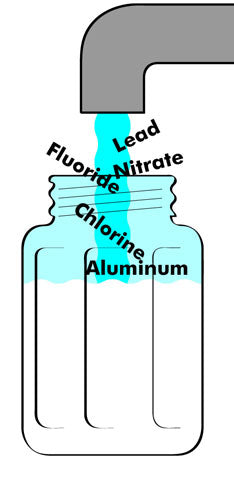
Newborn babies do just fine with formula or breast milk; drinking water is not recommended until about 6-12 months (too much water can cause jaundice or intoxication). For children under 1-year-old drinking, too much water may be a dangerous practice because it dilutes a baby’s normal sodium levels. Breast milk or formula provides all the fluid healthy babies need. Keep in mind that breastmilk is 88% water.
For newborns (especially under 4-5 weeks), water supplements can be risky
- Babies under two months old should not be given supplemental water.
- Too much water can lead to oral water intoxication.
- Babies who get water supplements are less interested in nursing. If baby is not nursing as often as they should it will take longer for the mom’s milk to come in.
- Water supplements fill the baby without adding calories. This can result in insufficient weight gain or weight loss.
For babies past the newborn stage
- Too much water can interfere with breastfeeding because it fills the baby up so he nurses are less. Water does not give the baby the nutrition it needs to grow.
- When your baby is beginning to learn a cup, giving him a few sips of water a couple of times a day is okay.
- Once your baby starts eating solids you may give him a few sips of water to help.
While most of the medical world pushes breastfeeding, many moms opt for formula or in fact, must use the substitute for health reasons. Whatever the reason behind not using breast milk, attention must be focused on one crucial ingredient to the formula: water. The World Health Organization states, "...concentrations of nutrient minerals in drinking water may contribute significantly to the total trace element and mineral intake of infants and young children...especially applicable to formula-fed infants during the first months of life, who may be the most vulnerable group affected by excessive concentrations of nutrients or contaminants in drinking water."
Formula can come ready to drink, which parents can be assured is safe. The formula also comes in the powder mixture, which water is mixed with. Because the latter infants will be in taking so much water through formula, the safety of that water should be the parents' focus. In an astonishing statistic, infants receive 40-60% of the lead they are exposed to through drinking water, which can cause damages including mental retardation. Nitrate, chlorine, aluminum and fluoride are other worries for babies drinking formula made with tap water. For this reason, most formula companies recommend bottled water or boiled tap water. Also, homes with water purification systems will be on the safer side. Contamination of water needs to limit.
What about hot weather?
In very hot weather, your baby may be losing extra water without urinating, so in these special cases, it may be okay to offer a baby 1-2 ounces of water between feedings. Most babies will do well with just a little bit of extra formula so there is no need to force this. Breastfed babies are even less likely to need extra water. A newborn baby should pee at least once in 24 hours, twice in the second 24 hours, and three times every day thereafter. If you are concerned your baby is dehydrated contact your health care provider.
For toddlers, pure drinking water can also aid in healthy teeth and gums. Many toddlers need a bottle to go to sleep with or they get antsy. But, giving a bottle of juice or milk can cause tooth decay. A bottle of water is suggested instead.
According to TodaysParent.com, until babies begin to eat food, they will get all of the nutrition they need from breast milk and formula. But, the site also says once a baby is older and drinking from a cup, water is preferred over juice as it satisfies thirst. (Plus, it will start a healthy water habit early!) Being a parent is far from easy but watching your kids grow healthy one step at a time is truly worth all the effort.



